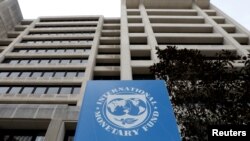Pakistan has secured initial approval of a $3 billion loan program from the International Monetary Fund to address its short-term acute balance of payments crisis and avoid a potential default.
Both sides announced the deal Friday, saying the "stand-by-arrangement," or SBA, spread over nine months, is subject to approval by the IMF executive board, expected to consider it by mid-July.
"This arrangement will help strengthen Pakistan's foreign exchange reserves, enable Pakistan to achieve economic stability, and put the country on the path of sustainable economic growth," Prime Minister Shehbaz Sharif said on Twitter.
"The efforts made in the past three months are what prevented Pakistan from defaulting," Sharif later told a news conference in the eastern city of Lahore.
Pakistan's foreign exchange reserves have dwindled to a historic low of around $3.5 billion by mid-June, just enough to buy the country a few weeks' worth of imports as opposed to the IMF-mandated three months of cover. Families across the impoverished South Asian nation of about 230 million are struggling to cope with ever-declining buying power in the wake of skyrocketing inflation.
The IMF said on its website that the new funding program would support the country's immediate efforts to stabilize the economy from recent external and internal setbacks.
The $3 billion loan is higher than expected for Pakistan. Islamabad was negotiating with the global lender for months to release the remaining $2.5 billion from a $6.5 billion bailout package agreed on in 2019, which expired Friday.
Nathan Porter, the IMF mission chief in Pakistan, said the new funding builds on the 2019 program and would provide "a policy anchor and a framework for financial support from multilateral and bilateral partners in the period ahead."
Porter said economic growth had stalled in Pakistan due to "some policy missteps" by the Sharif government, the catastrophic nationwide floods last year, and the international commodity price hike following Russia's war in Ukraine. "Inflation, including for essential items, is very high," he added.
Analysts said Friday's deal had averted the threat of default hanging over the country for over a year and would help bolster an all-time low market and industry confidence.
In the run-up to reaching the agreement, the Sharif government took politically risky measures to meet IMF demands in an election year. It revised the 2023-2024 budget, raising taxes, reversing subsidies in power and export sectors, increasing energy and fuel prices, agreeing to a market-based currency exchange rate, and cutting spending.
The adjustments would likely fuel an all-time high year-on-year official inflation of 38% in May.
"It will be important that the budget is executed as planned and the authorities resist pressures for unbudgeted spending or tax exemptions in the period ahead," Porter cautioned.
Former central bank governor Murtaza Syed blamed the government for pushing the country to the edge of default before securing the IMF deal.
"Pakistan dodged a bullet today," Syed tweeted. "We should heave a sigh of relief. But we should also ask why we were taken so close to the edge over the last 2 yrs when we knew we had no option but the IMF."
Syed noted that no other country had gone to the IMF more times than Pakistan has. "Our problems are structural. Today's IMF deal is not the end. There is still a lot of work to do to fix our economy. It should have started a long time ago. The next best time is now."
Michael Kugelman, the South Asia Institute director at the Wilson Center in Washington, said the IMF deal would give Pakistan "some economic breathing space." He warned that the next economic crisis in the country could be around the corner if political considerations prevent the government from introducing much-needed fiscal reforms.
"Islamabad waited until the very final hour to take the (politically risky) fiscal policy steps that the IMF had been hoping to see for months. If it had taken those steps earlier, much of the drama and fraught negotiations of recent months likely wouldn't have had to play out," Kugelman said on Twitter.
Critics said that the nine-month agreement with the IMF would get Pakistan through a caretaker government and elections due this fall, lowering the default risk and enabling the next government to negotiate a new loan program with the lender.
"The SBA comes after extensive damage to the economy by the government," opposition politician Hammad Azhar, a former federal minister, said on Twitter. "[The] SBA will act like a bridge loan to sustain us till elections. It's unlikely to reverse economic contraction or inflationary pressures in the short term," Azhar wrote.
Abid Qaiyum Suleri of the Islamabad-based Sustainable Development Policy Institute said the IMF deal is good news for the government.
"The bad news for people of Pakistan is that they should expect more inflation, hike in electricity and gas tariffs, and higher prices for petrol, diesel, and kerosine oil,'" Suleri said.
"The litmus test is whether government resists its appetite to spend lavishly in the run-up to elections," he said. "If we stay away from the policy missteps committed during the last nine months, I hope Pakistan's economy has gotten a chance to take off during the next nine months."
Pakistan has received almost two dozen IMF bailouts since the 1950s, making it one of the biggest customers of the Washington-based global lender.





